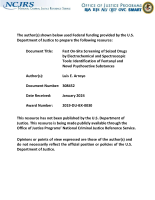Research
How Can Research Mediators Better Mediate? The Importance of Inward-Looking Processes
Re-examining the Normative, Expressive, and Instrumental Models: How Do Feelings of Insecurity Condition the Willingness To Cooperate With Police in Different Contexts?
Police Occupational Culture Testing the Monolithic Model
Using Latent Variable- and Person-Centered Approaches to Examine the Role of Psychopathic Traits in Sex Offenders
Surface Enhanced Raman Spectroscopy: A Review of Recent Applications in Forensic Science
Low Self-Control and Crime in Late Adulthood
Arrest and the Amplification of Deviance: Does Gang Membership Moderate the Relationship?
Understanding the Limits of Technology's Impact on Police Effectiveness.
Quantum of Force: The Consequences of Counting Routine Conducted Energy Weapon Punctures as Injuries
Research Insights for Practitioners
Social Bonds and Change During Incarceration: Testing a Missing Link in the Reentry Research
Robin Engel on Police Reform and Public Safety
What's Known and Unknown About Marijuana (Part 2)
Marijuana legalization poses many challenges — especially those related to drug chemistry and toxicology — for researchers, law enforcement, and policy makers. In the latest episode of Justice Today, NIJ Communications Assistant Josh Mondoro hosts a conversation with NIJ Scientist Frances Scott about marijuana toxicology, including comparing its effects to alcohol, measuring impairment, and maintaining public safety as more and more states legalize recreational marijuana.












